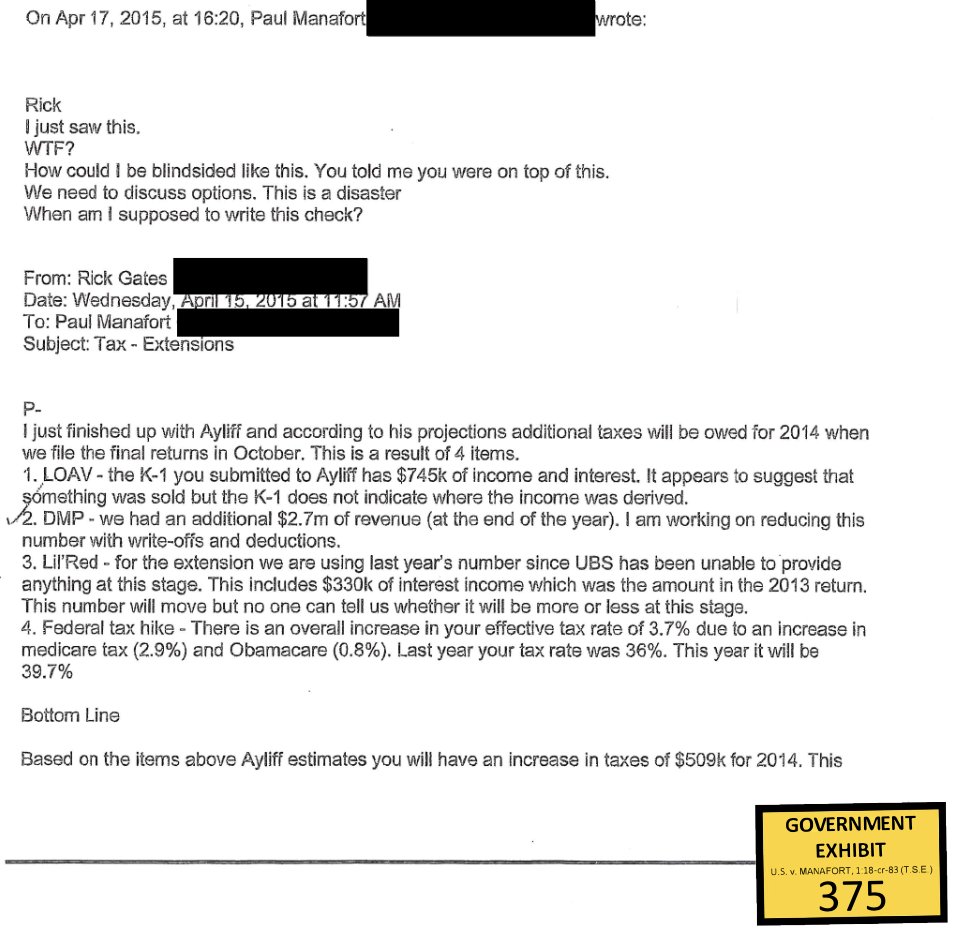

The details are redacted, but he seems to be saying that the super PAC head and the ad-buying firm had a kickback “scheme” - and that the super PAC head “may have” had a similar arrangement with Manafort. Weissmann explained his “educated guess” about what Manafort was trying to hide.

That was the reason for Monday’s hearing: to weigh the government’s case that the lies were deliberate, against the defense’s case that they were unintentional. But now, Judge Amy Berman Jackson is considering whether to take these purported lies into account when she sentences Manafort. Now, both Mueller’s and Manafort’s lawyers already agree that the government has reason to believe Manafort breached his plea agreement. But in November, the special counsel brought all this to a halt and told the court he believed Manafort had breached his cooperation commitment by lying. Manafort had three proffer sessions with Mueller’s team before he agreed to his plea deal, and nine further questioning sessions as well as two grand jury sessions afterward. Here, Weissmann likely mentioned the possibility of Trump pardoning Manafort - something that could indeed greatly affect “the normal motives and incentives that are build into a cooperation agreement.”Īnd in fact, later in the transcript, there is an unredacted reference to “a pardon” as one potential motivation Manafort could have. That is one reason why, he said, they agreed to let Manafort cooperate after one of his trials had already concluded. First, Weissmann said, there was “enormous interest” in “the intelligence that could be gathered from having a cooperating witness in this particular investigation” - meaning the Trump-Russia probe. He added that there were two “unusual” factors in Manafort’s plea deal. Weissmann revealed in court that, though the government went into the deal “with good faith,” he could not say at that point whether Manafort “was being truthful” in his proffer or whether he’d be able to substantially assist the investigation.
#Redacted text manafort trial#
Then, he struck a plea deal in DC to avert the second trial - and committed to cooperate with the government. Last August, Manafort was convicted at his first trial, in Virginia. He was charged with tax violations, bank fraud, lobbying, and false statements - but he was not charged with any crimes related to Russian interference in the 2016 election. To recap: Manafort was indicted by Mueller in two venues, Virginia and Washington, DC. “What are the odds that all of this was a mistake?” How we got here “Probably most important was the number of instances” that this problem came up, Weissmann said. Manafort’s attorneys argued that he didn’t deliberately lie, but rather there was a combination of memory failures and mix-ups from Manafort, and misunderstandings from the special counsel’s team.īut the special counsel’s office didn’t buy it. Why would Manafort lie after agreeing to cooperate? Prosecutor Andrew Weissmann even brought up the elephant in the room - and said Manafort could be motivated to try and “augment his chances for a pardon.” Prosecutor Andrew Weissmann said the FBI thinks Kilimnik “has a relationship with Russian intelligence.” So, he said, the meeting goes “very much to the heart of what the Special Counsel’s Office is investigating” - namely, the Trump campaign’s potential connections to the Russian government. A partially redacted transcript of that hearing has now been posted by CNN, and it reveals new details on the special counsel’s thinking.įor instance: While chairing the Trump campaign, Manafort secretly met with his longtime Russian associate, Konstantin Kilimnik. Mueller’s prosecutors made these arguments during a sealed hearing on Monday, February 4. Special counsel Robert Mueller’s team thinks Paul Manafort lied to them while he was supposedly cooperating with prosecutors in the Trump-Russia probe - and that Manafort may well have been trying to get Trump to pardon him.


 0 kommentar(er)
0 kommentar(er)
